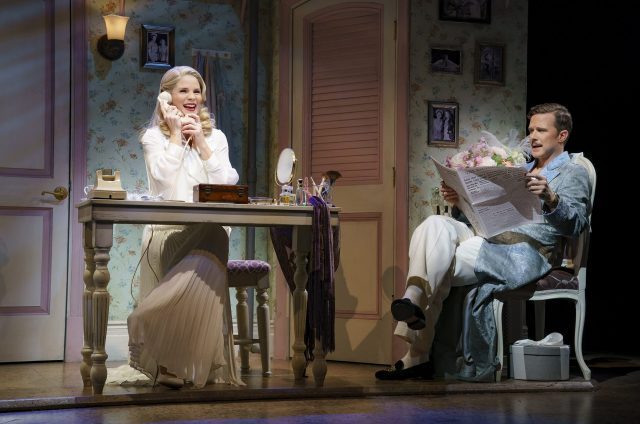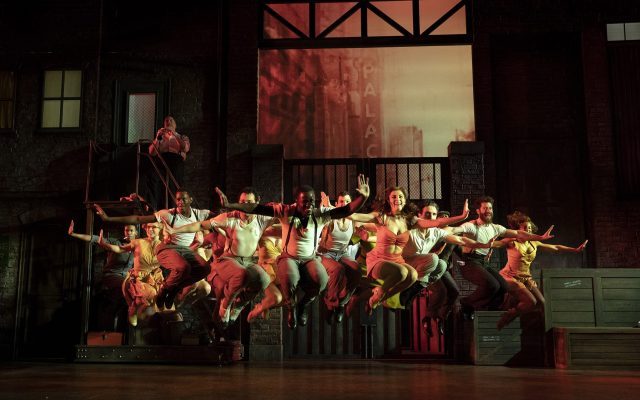
Kelli O’Hara and Will Chase star as a divorced couple making a musical version of The Taming of the Shrew in Kiss Me, Kate (photo by Joan Marcus 2019)
Studio 54
254 West 54th St.
Through June 30, $59-$352
212-719-1300
www.roundabouttheatre.org
The #MeToo makeover of golden age Broadway musicals continues with Roundabout’s Kiss Me, Kate, which opened March 14 at Studio 54. In the last year, major or minor changes have been made to My Fair Lady, Carousel, and Oklahoma! in order to deal with their troublesome presentations of sexism, misogyny, domestic violence, and gender inequality. Tony nominee Amanda Green (Hands on a Hardbody, Bring It On), who tweaked Roundabout’s 2015 revival of On the 20th Century, now does the same with Kiss Me, Kate, implementing small fixes that most audience members won’t notice in director Scott Ellis’s exuberant adaptation of one of Cole Porter’s most beloved shows, which in 1949 won the first-ever Tony for Best Musical and in 2000 won for Best Revival of a Musical. The book by Sam and Bella Spewack (Boy Meets Girl, My Favorite Wife), inspired by the real-life relationship of legendary actors Alfred Lunt and Lynn Fontanne during their 1935 revival of William Shakespeare’s The Taming of the Shrew at the Guild Theatre (now known as the August Wilson), also won a 1949 Tony.
The tale is set in the summer of 1948, as a company prepares for opening night of a musical version of Shrew at Baltimore’s Ford Theatre, hoping for an eventual Broadway run. The show is produced and directed by Fred Graham (Will Chase), who also plays Petruchio, opposite his ex-wife, movie star Lilli Vanessi (Kelli O’Hara), who is returning to the stage as Katharine (Kate), the character who supposedly needs taming. The backstage shenanigans mimic Shakespeare’s plot with an extra dollop of Hollywood screwball comedy as Petruchio woos Kate for her father’s (Mel Johnson Jr., who also plays stage manager Harry Trevor) money despite her resistance, for she wants no part of any man, while Fred and Lilli become enmeshed in a battle of the sexes over fame, fortune, and love. Fred is fooling around with the sweet but not-so-innocent ingénue Lois Lane (Stephanie Styles), who is dating Bill Calhoun (Corbin Bleu), a cad with a $10,000 gambling debt he has surreptitiously signed over to Fred. In the musical within the musical, Lois is Bianca, Kate’s younger sister, who has a trio of suitors, Gremio (Will Burton), Hortensio (Rick Faugno), and Lucentio, the last played by Bill. Lilli has just gotten engaged to General Harrison Howell (Terence Archie), a rigid military man who is not as devoted to his fiancée as he is to his country or other women. Meanwhile, Fred is being closely watched by two gangsters (John Pankow and Lance Coadie Williams) who are sticking around to collect their boss’s ten grand and who even take roles in the show to make sure Fred doesn’t go anywhere.

“Too Darn Hot” is a highlight of Roundabout revival of Kiss Me, Kate (photo by Joan Marcus 2019)
Ellis’s revival takes a while to get going, building too slowly. It isn’t until the second act opener, the sizzling “Too Darn Hot,” led by James T. Lane as Paul, Fred’s assistant, that the show starts hitting its mark. The chemistry between Tony nominee Chase (The Mystery of Edwin Drood, Nashville) and Tony winner O’Hara (The King and I, South Pacific) is just not there at the beginning; Fred is too unsympathetic, and Lilli is not shrewish enough, especially as compared to Petruchio and Kate. You just don’t want them to fall back in love. In her Broadway debut, Styles (Kingdom Come, Roman Holiday) is a delight as Lois/Bianca, and Pankow (Twelve Angry Men, The Iceman Cometh) and Williams (Sweat, Bootycandy) have fun as the gangsters, although “Brush Up Your Shakespeare” goes on too long. Paul Gemignani’s orchestrations of such Porter tunes as “Another Op’nin’, Another Show,” “Wunderbar,” “Why Can’t You Behave,” and “Where Is the Life That Late I Led?,” performed by a band positioned in the audience boxes on either side of the stage, go from syrupy to extravagant, with O’Hara cutting it loose with her operatic voice and making Lilli’s point exceedingly clear in “I Hate Men” (“I hate men. / Though roosters they, I will not play the hen. / If you espouse an older man through girlish optimism, / He’ll always stay at home at night and make no criticism, / Though you may call it love the doctors called it / Rheumatism. / Oh, I hate men.”).
The choreography by Tony winner Warren Carlyle (After Midnight; Hello, Dolly!) is highlighted by “Too Darn Hot,” which includes tap and lots of heat, and “Tom, Dick or Harry,” as Gremio, Hortensio, and Lucentio make their case to Bianca through dazzling moves. David Rockwell’s sets change to a choreography all their own. But even as Lilli strikes back at Fred, literally and figuratively, her ultimate choice does not feel as liberating as one might wish. “Come, come you wasp; i’ faith, you are too angry,” Petruchio tells Kate, who replies, “If I be waspish, best beware my sting.” Eight-time Tony nominee Ellis’s (Curtains, 1776) Shrew lacks the necessary sting, but it does have bite.